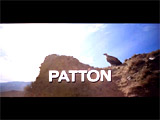
|
Patton
(1970)
In Franklin J. Schaffner's biopic
and epic war film (shot in 70 mm. widescreen color) - the winner
of seven Academy Award Oscars (including Best Picture, Best Actor,
Best Director, and Best Original Screenplay) - it provided
a survey of America's fiercest battle warrior: the
controversial, bombastic, idiosyncratic, multi-dimensional World
War II general and hero General George S. Patton (portrayed by Oscar-winning
George C. Scott who refused to accept his award) - the story was
based on two books: Patton: Ordeal and Triumph by Ladislas
Farago and A Soldier's Story by General Omar Bradley (portrayed
by Karl Malden):
- the unforgettable opening shot of the bigger-than-life
screen biography was of fierce American General 'Old Blood and Guts' George S. Patton in front
of an enormous red and white-striped US flag serving as a backdrop;
he was addressing Allied US troops of the Third Army (off-screen)
in a memorable, brilliant 6-minute pep-talk monologue to raise
morale just before they were deployed overseas at the start of
WWII: ("Now I want you to remember that no bastard ever won a war by dying
for his country. He won it by making the other poor dumb bastard
die for his country. Americans love a winner and will not tolerate
a loser. Americans play to win all the time. I wouldn't give a
hoot in hell for a man who lost and laughed. That's why Americans
have never lost and never will lose a war, because the very thought
of losing is hateful to Americans. Now, an army is a team - it
lives, eats, sleeps, fights as a team. This individuality stuff
is a bunch of crap...")
- Patton concluded his opening speech with: "Thirty
years from now when you're sitting around your fireside with your
grandson on your knee, and he asks you: 'What did you do in the
Great World War II?', you won't have to say: 'Well, I shoveled
s--t in Louisiana.' All right, now you sons-of-bitches, you know
how I feel and I will be proud to lead you wonderful guys into
battle anytime, anywhere. That's all."; his speech displayed
his fierce love of America
- during the early years of the war in 1943, in
the military campaign (the Battle of El Guettar) in Tunisia (North
Africa) against Germany's Field Marshal Rommel (Karl Michael Vogler)
known as "The
Desert Fox," Patton's military genius was exemplified when
his troops defeated the advancing German forces, and the Germans were
expelled from N. Africa; they quickly annihilated and
destroyed enemy tanks and infantry; Patton watched
through binoculars at a nearby outpost, and exclaimed that he had used
Rommel's own strategy against him in his book 'Infantry Attacks': "Rommel,
you magnificent bastard! I read your book!"; however, Patton
often ran into resistance from traditonal or conventional military
leaders, such as General Omar Bradley (Karl Malden)
- during plans for the invasion of Sicily in 1943
with the 7th Army to wrest it away from the Axis Powers, Patton
was forced to work with the more cautious and ineffective British
Field Marshal Sir Bernard Montgomery (Michael Bates), who Patton
regarded as a hindrance rather than as a complement; on his own
initiative, Patton demonstrated his winning philosophy by beating
Montgomery to Messina (the island's main eastern port) with a lengthy
pincer movement strategy (that took down Palermo along the way);
afterwards, the Italian leader Benito Mussolini was removed from
power in Italy and the Allies were able to invade Italy
- an Army field hospital incident nearly damaged
Patton's entire career (he also missed out on D-Day in mid-1944
after being reprimanded and losing his command); he responded to
a 'cowardly' combat-fatigued, shell-shocked soldier (Tim Considine)
who whimpered: "I-I guess I just can't take it, Sir...It's my nerves, Sir.
I-I just can't stand the shelling anymore,"; Patton was exasperated
with the recruit: "Your nerves? Well, hell, you're just a God-damned
coward" - Patton slapped the soldier back and forth with his
gloves: "Shut up! I won't have a yellow bastard sitting here
crying in front of these brave men who have been wounded in battle!
(He knocked off the soldier's helmet) SHUT UP!"; he then ordered
the doctors to not admit the patient: "Don't admit this yellow bastard. There's nothing wrong with
him. I won't have sons-of-bitches who are afraid to fight stinking
up this place of honor! (To the soldier) You're going back to the
front, my friend. You may get shot, and you may get killed, but you're
going up to the fighting. Either that, or I'm gonna stand you up
in front of a firing squad. I ought to shoot you myself, you god-damned
bastard! Get him out of here! Send him up to the front! You hear
me? You God-damned coward! I won't have cowards in my army."
- after Patton was reprimanded and demoted as punishment
for his verbal abuse treatment and slapping of the fearful, battle-fatigued
soldier, he delivered a very curt public 'apology' speech to
assembled troops: "I thought I would stand up here and let
you people see if I am as big a son-of-a-bitch as some of you think
I am. (laughter) I assure you I had no intention of being either
harsh or cruel in my treatment of the soldier in question. My sole
purpose was to try to restore in him some appreciation of his obligations
as a man and as a soldier. 'If one can shame a coward,' I felt,
'one might help him to regain his self-respect.' This was on my
mind. Now, I freely admit that my method was wrong, but I hope
you can understand my motive and will accept this explanation -
and this apology"
- the fearless, flamboyant, pugnacious and self-confident
maverick Gen. Patton ran out of a meeting mid-stream in a headquarters
building during an air raid (right after an Allied Air Force officer
had bragged: "You will see no more German planes"); he
stood in a street and bravely fired his pistol at German planes
strafing the area - he yelled out: "Come on, you bastards.
Take a shot at me, right in the nose"; one of his officers
cautioned: "Get back in here, George. We need a corps commander,
not a casualty"
- before the Battle of the Bulge, Patton requested
a weather-related prayer from the chaplain, and then read outloud:
"Almighty and most merciful Father, we humbly beseech Thee of
Thy great goodness to restrain this immoderate weather with which we
have had to contend. Grant us fair weather for battle. Graciously harken
to us as solders who call upon Thee that, armed with Thy power, we
may advance from victory to victory, and crush the oppression and wickedness
of our enemies, and establish Thy justice among men and nations. AMEN."
- under Patton's leadership, the Third Army swept
brilliantly across France; he dramatically rescued the trapped
101st Airborne under siege at Bastogne during the Battle of the
Bulge; then he swept into Germany - moving faster
and covering more ground than any army in US history; Patton pushed
his troops all the way to Czechoslovakia but was ordered to step
aside to allow Montgomery and the Russian troops to wipe out the
already defeated German army
- Patton despondently displayed his arrogant power-lust
as he confessed: "I love it. God help me, I do love it so.
I love it more than my life"
- as the war ended on the battlefield, the outspoken
Patton insulted and snubbed America's current ally Russia, and then
unwisely compared the defeated Nazis to other US political parties;
he was removed and relieved from command and delivered a sad farewell
to his staff
- in the film's conclusion after the war, Patton's voice-over
recalled history; his words were delivered while he was walking
his bull terrier Willie over the countryside; he spoke about a returning
Roman war hero who was given a victory parade: "For over a thousand
years, Roman conquerors returning from the wars enjoyed the honor
of a triumph - a tumultuous parade. In the procession came trumpeters
and musicians and strange animals from the conquered territories,
together with carts laden with treasure and captured armaments. The
conqueror rode in a triumphal chariot, the dazed prisoners walking
in chains before him. Sometimes his children, robed in white, stood
with him in the chariot, or rode the trace horses. A slave stood
behind the conqueror holding a golden crown and whispering in his
ear a warning, that all glory is fleeting."
|
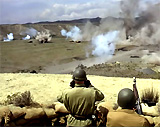
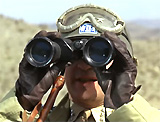
During Battle Against Rommel: "You magnificent bastard!
I read your book!"
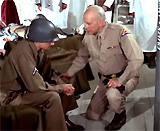
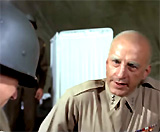
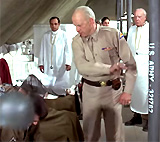
The Infamous Slapping Scene
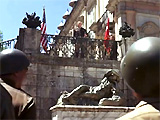
Patton's Forced Apology Speech
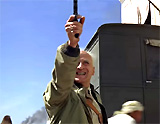
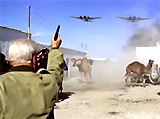
Patton Firing His Pistol at German Planes
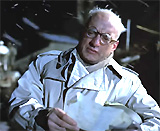
Reading the Weather-Related Battle Prayer
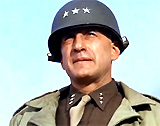
"I love it. God help me, I do love it so. I love
it more than my life"
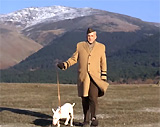
Patton's Concluding Voice-Over
|












